Israel Thwarts Iranian Weapons Smuggling Operation To West Bank Terror Cells
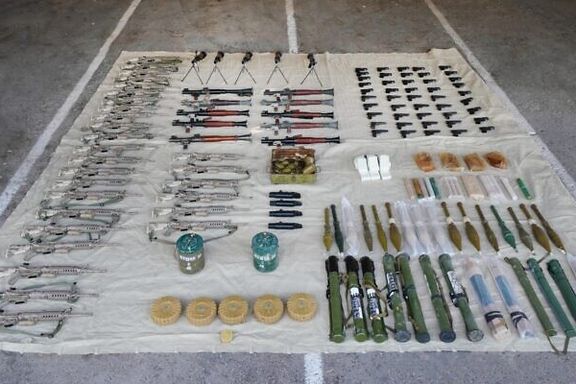
The Israeli security agency, Shin Bet, has foiled an attempt to smuggle Iranian weapons to terrorists in the West Bank.

The Israeli security agency, Shin Bet, has foiled an attempt to smuggle Iranian weapons to terrorists in the West Bank.
The Shin Bet and Israel Defence Forces managed to intercept a “significant” cache of arms smuggled by Iran into the West Bank including fragmentation bombs, anti-tank mines, grenade launchers, explosives, shoulder-launched missiles, assault rifles, and handguns.
According to Shin Bet, the operation was orchestrated by Iran's Special Operations Division, Unit 4000, led by Jawad Ghafari, in collaboration with Unit 18840 of the IRGC's Quds Force, under the command of Asghar Bakri.
The plot came to light during interrogations of detained Palestinians suspected of terrorist activities. Shin Bet revealed the involvement of Munir Makdah, a senior Fatah official based in Lebanon's Ein el-Hilweh Palestinian refugee camp, describing him as a long-standing collaborator with Hezbollah and the IRGC.
During investigations, it emerged that Makdah had been recruiting Palestinians in the West Bank for terror operations, including smuggling Iranian weapons and providing financial support.
Iran has long backed militant groups in Palestine amid its shadow war against its arch-enemy, Israel. Hamas has a significant presence in the West Bank in addition to groups such as Lion’s Den.
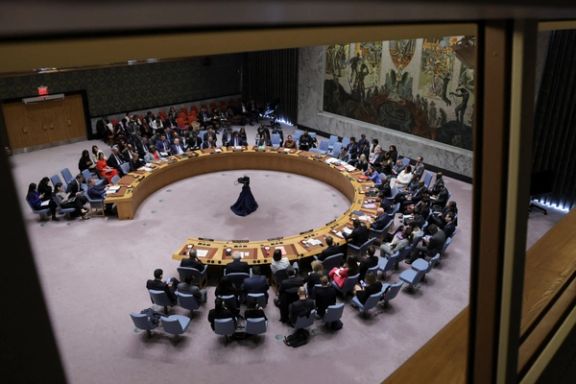
Iran has celebrated the UN's resolution calling for an immediate ceasefire in Gaza amid the war waged by Iran-backed militant group, Hamas.
"The resolution for an immediate ceasefire in Gaza, finally approved by the United Nations Security Council, signifies a crucial step towards ending the suffering of innocent civilians," reported state news agency, IRNA after an overwhelming 14 out of 15 Security Council members voted in favor of the resolution.
"The decisive action by the Security Council reflects the international community's commitment to peace and stability in Gaza,” added IRNA.
After vetoing three similar ceasefire resolutions in the past, Washington chose to abstain this time, enabling the resolution to pass without objection from permanent Security Council members, dealing a blow to its ally, Israel.
Hamas invaded Gaza on October 7, killing 1,200 mostly civilians and kidnapping over 250 more. It led to a relentless retaliation by Israel in a bid to wipe out Hamas and bring back the hostages. Until now, the US has supported Israel's right to defend itself, but pressure on the Biden government has grown in the wake of the humanitarian crisis in Gaza.
The Tasnim news agency, affiliated with the Iranian Revolutionary Guard Corps (IRGC), emphasized the shift in US policy, hailing the US's decision not to veto the ceasefire resolution and expressed satisfaction over Israeli Prime Minister Netanyahu's protest against the Biden administration by canceling an Israeli delegation's trip to Washington.
The US Ambassador to the United Nations, Linda Thomas-Greenfield, explained the US position, stating that while the latest resolution incorporated edits requested by the US, it still fell short of complete alignment with US priorities. "Any ceasefire must be coupled with the release of all hostages,” she stressed.
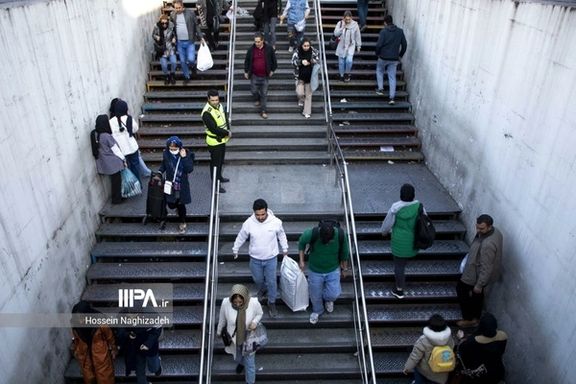
Iranian government bodies and affiliated institutions have collectively endorsed the use of cash fines as a means to enforce compulsory hijab, a lawmaker has revealed.
Amir-Hossein Bankipour, a member of the Supreme Council of Cultural Revolution and recently re-elected lawmaker, disclosed in an interview aired on the Esfahan channel of state-run television (IRIB) Saturday that the Supreme Council of the Cultural Revolution, Supreme National Security Council, judiciary, parliament, Guardian Council, and the administration of President Ebrahim Raisi, among others, jointly made the decision to implement cash fines.
According to Bankipour, the decision came about as a result of discussions on avoiding direct confrontations between the police and the public over hijab enforcement, as well as the potential burden on the judiciary from prosecuting numerous cases related to hijab violations.
Hardliners dominating the government and many clerics have been sounding the alarm at more signs of defiance by ordinary people to rigid religious restrictions. In addition to hijab, many Iranians publicly celebrated Norouz in the past week, by dancing and eating in public, while the New Year coincided with the Ramadan fasting month.
The hardliner lawmaker claimed that cash fines were only to be levied on women who appear in public in “very inappropriate and repulsive attire” and claimed that the public, including women who do not fully abide by hijab rules, are opposed to these women’s perceived indecency.
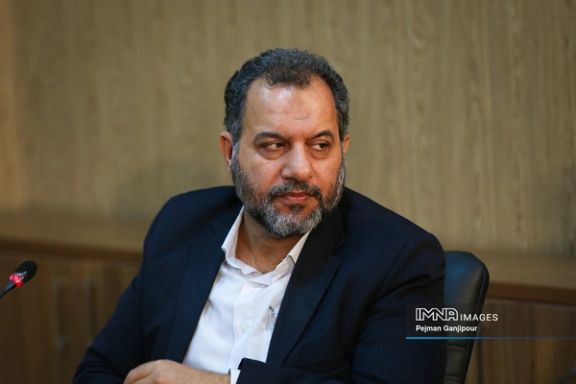
“There was a lot of discussion, and the best solution [that was suggested] was a deterrent fine … We decided to impose a deterrent fine for ringleaders of [moral] corruption,” he added.
Previously, lawmaker Mojtaba Karbasi had announced that first-time offenders would face a fine of 30 million rials (approximately $50), which would be deducted directly from their bank accounts without requiring their consent. Repeat offenders would face a fine of 240 million rials (around $400).
Authorities are currently utilizing footage from traffic and security cameras to identify hijab offenders, resulting in fines for tens of thousands of individuals caught "unveiling" in various public settings.
The proposed measure against hijab offenders is an amendment to a controversial bill, generally referred to as the “Hijab and chastity bill”, that the parliament approved in June 2023.
The constitutional watchdog, the Guardian Council, however, rejected the bill in October and sent it back to parliament for amendment and removal of verbal ambiguities.
Experts said at the time, that rejection of the bill was mainly for formal issues and had nothing to do with people’s objection to its provisions.
Hardliners have been looking for ways to strengthen the enforcement of hijab after their ‘morality police’ tactic of arresting women for “improper hijab” backfired with the death of Mahsa Amini in September 2022, triggering nationwide Woman, Life, Freedom protests that lasted for months and shook the Iranian regime to its core. More than 550 civilians were killed by security forces and around 22,000 arrested.
The morality police have largely disappeared from the streets since Amini’s death and the resulting protests as authorities feared further enraging people.
Many Iranians, including some women who wear the hijab themselves, believe that wearing or not wearing the hijab is a personal decision. Eighty four percent of the over 12,000 respondents to an online poll by the reformist Shargh daily in October said they were opposed to mandatory dress code and headscarves.
Since March 2023, hardliners have attempted to end women's increasing defiance of compulsory hijab and reclaim lost ground through various instructions to government bodies, but their efforts seem to have hugely backfired as the number of women who refuse to abide by the current rules has very noticeably increased since then.
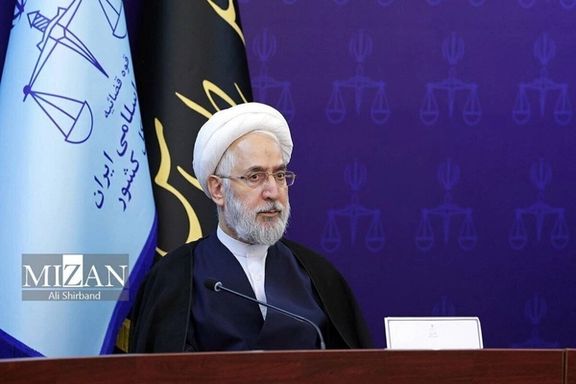
Iran's Attorney General has urged punishment for those who fail to adhere to the strict regulations of Ramadan amid the strongest anti-regime sentiment since the Islamic Republic was founded.
Mohammad Movahedi stressed the role of agencies like the Prosecutor's Office in addressing visible infractions, including feigning the breaking of fast or engaging in behavior that according to him “undermines societal values.”
"Deviant behavior is intolerable for the people, particularly those lacking religious awareness or influenced by contrary ideologies," stated Movahedi.
Meanwhile, Mohammad Sadegh Koushki, a prominent political activist known for his hardline stance, criticized the government's response to open fasting-breaking during Ramadan, citing a perceived increase in such incidents.
"We've just completed the second week of Ramadan, witnessing the widest wave of open fasting-breaking in the history of the Islamic Republic," said Koushki, attributing the trend to perceived “negligence” on the part of executive and judiciary leaders.
Koushki singled out government entities, such as the Ministry of Heritage, Ministry of Interior, and Ministry of Roads, for failing to prioritize Ramadan and implement measures to uphold its sanctity and prevent fasting violations.
In recent years, there has been a decline in the number of people observing the Muslim fasting period during Ramadan. However, authorities continue to enforce strict penalties, including arrest and fines, for those who openly flout the rules in public.
During Ramadan, Muslims are required to abstain from food and drink from dawn to dusk, in addition to avoiding actions mentioned in the Qur'an. Law enforcement agencies implement a national plan annually to address Ramadan rule violations, with transgressors potentially facing detention and lashings as part of the consequences.
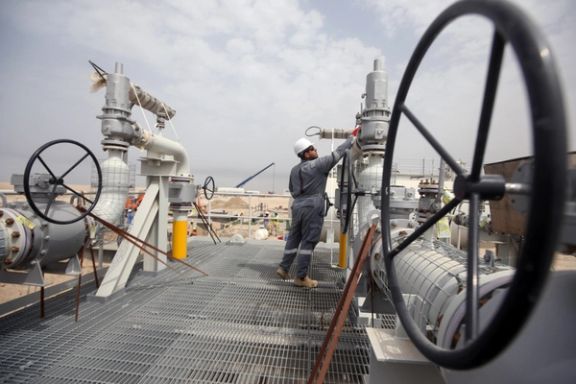
As collaboration between Iran and Iraq on oil field development continues, experts are highlighting the significant challenges posed by sanctions in the process.
Energy analyst Morteza Behrouzifar highlighted that it would harm Iraq to continue with the project. “Iraq currently enjoys access to global facilities, financial resources, and major international companies, whereas Iran faces limitations due to sanctions,” he said amid Iran's sanctions for its nuclear program, human rights abuses and support of Russia's war on Ukraine.
He noted that Iran's restricted access to global facilities, financial resources, and major international companies due to sanctions severely impedes progress.
A major deal was signed with Iraq last week to develop six oil fields in the south and west of the country, just a week after entering into $20bn contracts to boost pressure in the South Pars gas field.
According to Shana News Agency, the upstream deals with local private firms, worth more than $13bn in investment, are aimed at expanding Iran’s crude output, which stands at 3.45mn barrels per day.
The oil fields include Azadegan and Masjed Soleyman in southern Khuzestan province, Azar in western Ilam province, and Sumar, Saman, and Delavaran in western Kermanshah province.
Oil Minister Javad Owji said the contracts would add up to 400,000 more barrels to Iran’s daily crude output.
Meanwhile, recent developments in Iran's oil industry have raised questions about domestic capabilities. The Iranian oil ministry's $11.5 billion contract with 11 domestic firms, spearheaded by Advand Azadegan Company, has drawn scrutiny due to the latter's limited track record in oil exploration and extraction.
Iran's oil industry is in the midst of a crisis as approximately 80% of its active oil fields are in the latter stages of their life cycle, experiencing productivity declines. To mitigate this, Iran requires substantial gas injection, but shortages hamper efforts, with only a fraction of the required volume being injected daily.
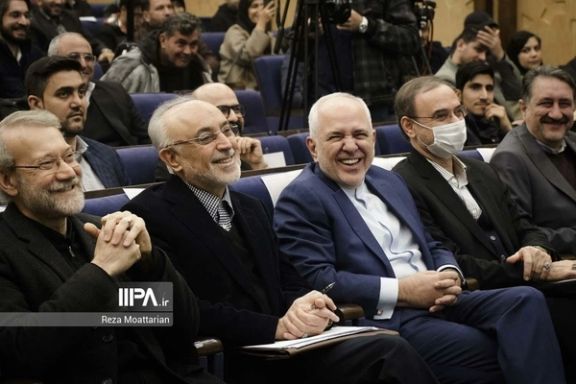
Upon leaving office, politicians often resort to writing books to claim that: "I was an important person. I did my job well. They did not appreciate me. Now, you can take advantage and benefit from my experience."
But with his memoir published in Persian in Tehran, The Depth of Patience (or The Audacity of Resilience), former Iranian Foreign Minister Mohammad Javad Zarif seeks to do much more than that.
Zarif – whose role as Minister was really an illusion – tries to draw an effective and decisive case for the role of the Foreign Ministry. All the while, he was never part of the real game.
In an interview with the Jamaran website in Tehran, Zarif says that he was never seen as an "insider" and that he was considered "to be on his way out" from the Ministry of Foreign Affairs – and that is why, he claims, the employees of the ministry did not click the like button for his tweets.
Zarif was often left out of key foreign policy developments, such as during Bashar al-Assad's controversial trip to Iran in 2019, or he was left in the dark about Iran’s attack on the Ain al-Assad US base. At the same time, the Iraqi prime minister had prior knowledge of the attack, while he remained in the dark.
In his memoir, he fails to say what his master plan was – or even what his tenure achieved in eight years, during which millions of dollars of Iranian resources were squandered on numerous foreign trips.
He could have said that improving relations with the West and easing the burdens of the people are not possible within the confines of the current regime – and that the Iranian people have no choice but to overthrow it. But, steadfast in his loyalty to Supreme Leader Ali Khamenei, he did not dare to do so.
In his writings, Zarif consistently portrays himself as unaware of the purpose for which he was chosen: He was picked not for his capabilities, skill in deception or even being a good liar – but, because he could spearhead a lobbying effort in America to sell the idea of a peaceful nature of the nuclear program.
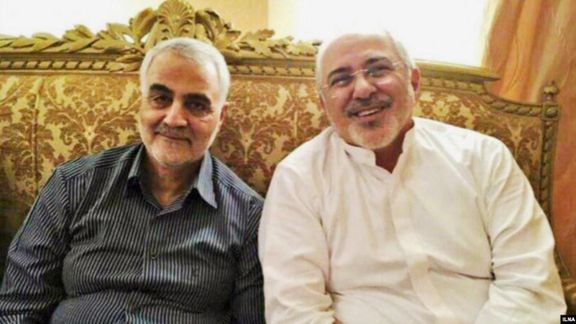
Zarif was chosen to champion the JCPOA at a crucial juncture when the regime sought European involvement on the issue, to advance its own regional expansion agenda. All the while, Khamenei and the IRGC harbored distrust toward him. For this reason, ambassadors to regional countries were appointed not by him, but by Qassem Soleimani.
Illusions of success
Zarif's eight-year tenure was nothing short of a glaring failure in foreign policy and diplomacy, with the regime’s nuclear program, terrorism, and expansionism setting the stage for this dismal outcome.
One prominent example showcasing his foreign policy shortcomings, and indicative of his limited authority, occurred in 2016.
Just months after the nuclear deal was agreed on, attacks on the Saudi missions in Iran undermined then-President Hassan Rouhani and shattered any illusion of moderation in Iran's foreign policy. Orchestrated by so-called hardliners, the attacks signaled to the West that Khamenei’s nefarious agenda would continue – deal or no deal.
Despite the Rouhani administration's alleged intention to de-escalate tensions with the West, after the failure of political reforms by the reformists, and to foster better foreign relations – by the end of Zarif’s eight-year term, there were no tangible achievements to show for his efforts.
The most important delicate waste
To sweep his lack of success under the rug, Zarif chooses to sidestep crucial matters in his book and focuses solely on peripheral issues.
One way Zarif infamously justified his abysmal record is by using the phrase "we chose ourselves" – a phrase that shifts the responsibility for the choices made by the Islamic Republic, along with its policies and programs, onto the people indefinitely. This particular statement has long angered Iranian dissidents, who argue that there was a revolution 45 years ago with the intention of creating a more democratic country, but clerics steered the new regime towards a dictatorship. Even if a choice was made in 1979, people have a right to demand change after four decades.
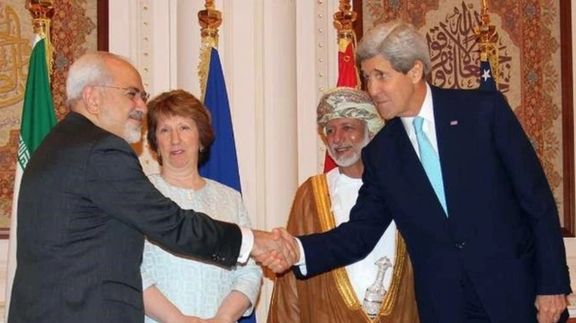
In his book, he changes the content of his baseless phrase; Choosing it as a title (TDP, p. 27) he instead discusses idealism and realism in foreign policy – irrelevant to the context of the original meaning of his statement.
While the title of Zarif’s book aims to highlight his purported patience and perseverance, the only areas where the former Minister demonstrated such traits were in deception, manipulating the public, covering up misdeeds, and self-promotion before Ali Khamenei and IRGC commanders.
Two key challenges
As a diplomat who claims the art of persuasion and justification, Zarif faced two significant challenges during his tenure, wherein his success was notably lacking.
The first involved maintaining regular relations with Ali Khamenei, necessitating the balance of praising the Supreme Leader while disliking his Russophile policy.
In this context, he demonstrates his allegiance to Khamenei by portraying him as a servant of the nation and the country, asserting, "The cornerstone of the Leader's approach to foreign policy has always been grounded in honor." (TDP, p. 101)
Then, he defines honor, stating, "He is exceedingly vigilant and meticulous regarding the constitution, prioritizing national dignity and thwarting any attempts by foreign powers to exert dominance over the Islamic Republic." (ibid.) Zarif refutes assertions portraying the Leader as a revolutionary, which imply a disregard for international regulations.
In the case of the IRGC's downing of Ukrainian Flight PS752 in 2020 and the regime's initial three-day denial of responsibility, Zarif once again attempts to deceive the reader.
Zarif tries to present himself as a brave and expedient person in deception and concealment and complains that he was not allowed to "cure" (justify and trowel) the issue. (TDP, p. 139)
Years after leaving office, Zarif is still trying to wash his own hands and absolve himself of any responsibility.